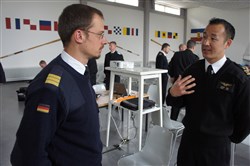STUTTGART, Germany — Lessons learned from domestic Counterdrug operations help the National Guard use its State Partnership Program to assist foreign partners tackling illegal narcotics in their countries.
The Nebraska National Guard assists Kyrgyzstan, the New Jersey National Guard works with Albania and a project is underway in Estonia, which is partnered with Maryland.
About 50 percent of the heroin from Afghanistan comes through the southern region of Kyrgyzstan en route to Europe, said Maj. Gen. Timothy Kadavy, the adjutant general of the Nebraska National Guard.
Kadavy briefed participants in a SPP conference here at Patch Barracks on effectively developing partner capacity hosted by U.S. European Command's Directorate of Mobilization and Reserve Affairs this week.
In the Kyrgyzstan case, the Department of State asked the National Guard Bureau's Counterdrug program to assist the Kyrgyzstan Drug Control Agency, Kadavy said.
The mission was to create a Kyrgyz interagency elite mobile interdiction capability that leveraged efforts by the nation's drug control agency, its interior ministry and its customs and border service, he said.
From 2006 until 2008, the Nebraska National Guard helped Kyrgyz officials develop the concept for the operation, properly equip it, write standard operating procedures and train participants.
Drug seizures and multiple arrests resulted, Kadavy said, and drug activity moved to other areas of the continent.
Marijuana, hashish and hashish oil originate in Albania, and this Balkan country on the Adriatic Sea also is a stop in the heroin and cocaine trade, said Dede Gjoka of the Albanian State Police.
Although it's hard to track exact numbers, Albania estimates about 30,000 residents are drug users and about 40 die each year from overdoses, Gjoka said.
The New Jersey National Guard assisted the country by developing middle and high school level education programs, advising local officials on community policing, training customs and border patrol officers and helping to develop aerial and electronic surveillance and thermal imaging programs, Gjoka said.
The programs demonstrate the kind of military-to-military and military-to-civilian activities possible in the SPP.
The National Guard Bureau's SPP pairs National Guard states with foreign countries. Within the EUCOM area of operations, 20 states help increase the capacity and capabilities of 21 partner countries.
Military-to-military engagement is the primary focus of the SPP, promoting defense and security cooperation in emergency management, disaster response, border and port security, leadership and noncommissioned officer development, medical capacity, economic security, natural resource protection, peacekeeping, counter trafficking, counter proliferation and counter- and anti-terrorism.
The SPP supports combatant commanders' theater campaign plans and ambassadors' mission plans.






